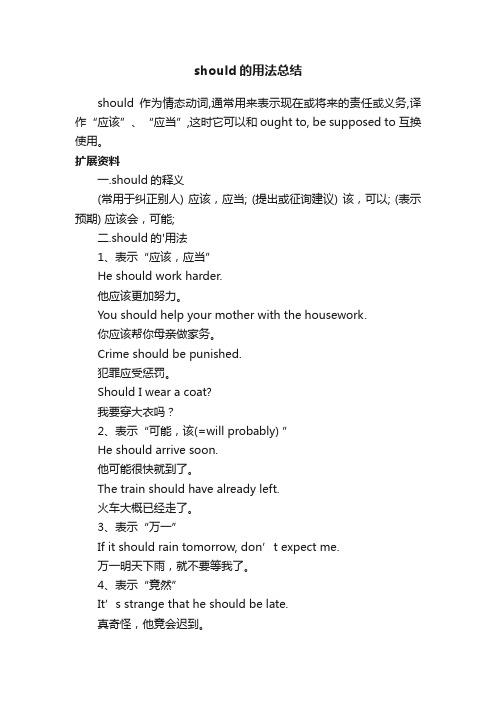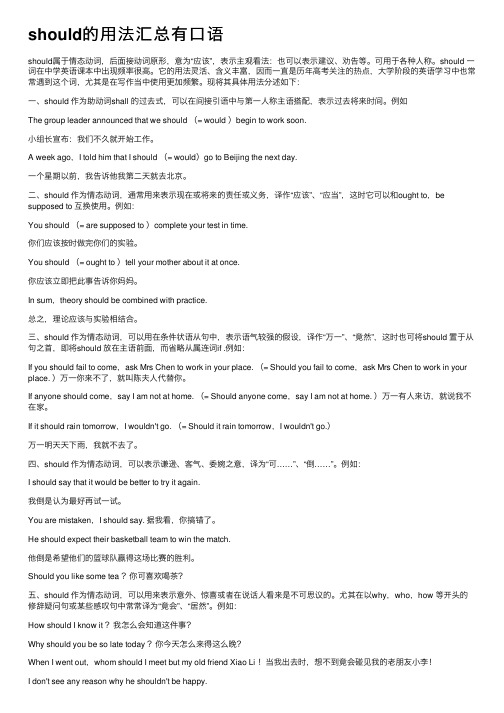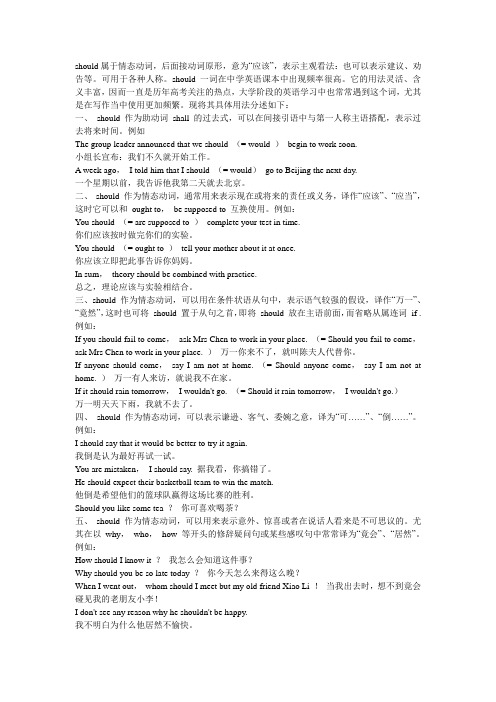should用法详解
should的用法总结

should的用法总结should作为情态动词,通常用来表示现在或将来的责任或义务,译作“应该”、“应当”,这时它可以和ought to, be supposed to 互换使用。
扩展资料一.should的释义(常用于纠正别人) 应该,应当; (提出或征询建议) 该,可以; (表示预期) 应该会,可能;二.should的'用法1、表示“应该,应当”He should work harder.他应该更加努力。
You should help your mother with the housework.你应该帮你母亲做家务。
Crime should be punished.犯罪应受惩罚。
Should I wear a coat?我要穿大衣吗?2、表示“可能,该(=will probably) ”He should arrive soon.他可能很快就到了。
The train should have already left.火车大概已经走了。
3、表示“万一”If it should rain tomorrow, don’t expect me.万一明天下雨,就不要等我了。
4、表示“竟然”It’s strange that he should be late.真奇怪,他竟会迟到。
5、表示粗暴地拒绝一项建议、要求或指示What time does the film start?电影什么时候开始?How should I know?我怎么知道?Ann’s very unhappy.安非常不高兴。
Could your wife help us in the office tomorrow?你妻子明天能到办公室来帮帮我们吗?6、should加完成式:should have done表示“本应该做某事,但事实上却没有做”;shouldn’t have done表示“本不该做某事,但事实上却做了”。
如:You should have got up earlier. 你本应该早点起的。
should用法总结汇总

千里之行,始于足下。
should用法总结汇总Should是一个情态动词,用于表示建议、意愿、命令、推想等。
它有多种用法和结构,下面将对should的用法进行总结。
1. 表示建议:a. 主语+should+动词原形:用于表示一般性的建议或意愿。
- You should exercise regularly to stay healthy.(你应当经常熬炼以保持健康。
)- We should leave early to avoid traffic.(我们应当提前离开,以避开交通拥堵。
)b. 主语+would/should+动词原形:用于表示有礼貌或客气的建议。
- Would you should drop me off at the station?(你可以把我送到车站吗?)- Should I help you with your luggage?(我来帮你拎行李吗?)c. It is (high) time that+主语+should+动词原形:用于表示“早该……了”。
- It is high time that we should take action to protect the environment.(我们早该实行行动爱护环境了。
)- It is time that you should start looking for a job.(你早该开头找工作了。
)2. 表示命令或要求:主语+should+动词原形:用于表示命令、要求或建议具有强制性的状况。
- You should stop talking in class.(你应当停止在课堂上讲话。
) - They should pay the bill before leaving the restaurant.(他们离开餐厅之前应当先付款。
)第1页/共2页锲而不舍,金石可镂。
3. 表示推想、假设、猜想:a. 主语+should+动词原形:用于表示对某种可能性或预期结果的猜想。
should 的用法

高中英语语法学习:“should”用法归纳一、Should 表示过去将来时,即从过去观点看将来要发生的是,多用于间接引语中。
We thought that we should never see you again. 我们想我们再也看不到你了。
The BBC weather report this morning said that we should have rain.今天早上,BBC电台天气报告说,今天有雨。
二、Should 表示义务、责任、常译为“应当”,“应该”,或表示一种估计的情况,译成“按理应当”,“估计......”。
Why should I pay him? 为什么我该付给他钱?They should be there by now, I think. 我估计,他们现在到那儿了。
Should 用于完成时态,表示对过去发生的动作的一种推测,译成“应该已经......”。
You should have washed the wood. (But you haven‘t.) 你应该把伤口清洗了。
(然而你没有)三、Should 用于虚拟语气中。
(1)用于It is necessary (important, strange.。
that.。
)中,在美国英语中should 常省去。
It is important that we (should) learn English well. 我们学好英语很重要。
(2)用于It is ordered (suggested)that.。
中,而在美语中should常省去。
It is decided that we (should) finish our work in a week.决定我们要在一周之内完成我们的工作。
(3)用于表示命令、请求、建议、决定等词后面的宾语从句中,在美国英语中should 常省去。
He wrote, suggesting that Mr. Wang (should) come to Beijing. 他信中建议王先生到北京来。
英语中should的用法归纳

英语中should的用法归纳一、Should 表示过去将来时,即从过去观点看将来要发生的是,多用于间接引语中。
We thought that we should never see you again. 我们想我们再也看不到你了。
The BBC weather report this morning said that we should have rain.今天早上,BBC电台天气报告说,今天有雨。
二、Should 表示义务、责任、常译为“应当”,“应该”,或表示一种估计的情况,译成“按理应当”,“估计......”。
Why should I pay him?为什么我该付给他钱?They should be there by now,I think. 我估计,他们现在到那儿了。
Should 用于完成时态,表示对过去发生的动作的一种推测,译成“应该已经......”。
You should have washed the wood. (But you haven't.)你应该把伤口清洗了。
(然而你没有)三、Should 用于虚拟语气中。
(1)用于It is necessary (important,strange.。
that.。
)中,在美国英语中should 常省去。
It is important that we (should)learn English well. 我们学好英语很重要。
(2)用于It is ordered (suggested)that.。
中,而在美语中should常省去。
It is decided that we (should)finish our work in a week.决定我们要在一周之内完成我们的工作。
(3)用于表示命令、请求、建议、决定等词后面的宾语从句中,在美国英语中should常省去。
He wrote,suggesting that Mr. Wang (should)come to Beijing. 他信中建议王先生到北京来。
should 的用法

should 的用法英语单词 should 是一个常用的情态动词,它有多种用法和意思,可以表示建议、责任、义务、预期、本应、以免、万一、竟然等。
本文将介绍 should 的五种主要用法,并给出相应的例句和解释,帮助你掌握这个重要的英语单词。
一、表示建议、责任或义务should 可以用来表示现在或将来的建议、责任或义务,译作“应该”、“应当”,这时它可以和 ought to, be supposed to 互换使用。
例如:You should quit smoking for your health.(你应该为了你的健康而戒烟。
)We should respect our teachers and parents.(我们应该尊敬我们的老师和父母。
)What should I do if I lose my passport?(如果我丢了护照,我应该怎么办?)You ought to finish your homework before you watch TV.(你应该在看电视之前完成你的作业。
)He is supposed to be here at 10 o'clock.(他应该在十点钟到这里。
)二、表示预期或期待should 可以用来表示对现在或将来的某种情况的预期或期待,译作“应该”、“可能”、“恐怕”。
例如:She should be home by now.(她现在应该已经到家了。
)They should have arrived in Beijing yesterday.(他们应该昨天已经到达北京了。
)It should rain tomorrow according to the weather forecast.(根据天气预报,明天应该会下雨。
)He should know the answer, he is very smart.(他应该知道答案,他很聪明。
)You shouldn't drive so fast, it's dangerous.(你不应该开得这么快,很危险。
should用法归纳

should 用法归纳一、 Should 表示过去将来时,即从过去观点看将来要发生的是,多用于间接引语中。
We thought that we should never see you again.我们想我们再也看不到你了。
The BBC weather report this morning said that we should have rain.今天早上, BBC 电台天气报告说,今天有雨。
、Should 表示义务、责任、常译为 “应当”,“应该”,或表示一种估计的情况, 译成 “按理应当 ”,“估计 . 。
Why should I pay him? 为什么我该付给他钱 ? They should be there by now, I think. 我估计,他们现在到那儿了。
Should 用于完成时态,表示对过去发生的动作的一种推测,译成 “应该已经 You should have washed the wood. (But you haven ‘t.)、 Should 用于虚拟语气中,strange. 。
that.。
)中,在美国英语中should 常省去。
It is important that we (should) learn English well.(2) 用于 It is ordered (suggested)that. 。
中,而在美语中 should 常省去。
It is decided that we (should) finish our work in a week.决定我们要在一周之内完成我们的工作。
(3) 用于表示命令、请求、建议、决定等词后面的宾语从句中,在美国英语中 He wrote , suggesting that Mr. Wang (should) come to Beijing. 来。
The commander ordered that the city (should) be taken in five days.天之内占领这座城市(4) should 用于表示命令、 请求、建议、决定等词后面的表语从句, 同位语从句中, 在美国英语中 should常省去。
Should用法

Should用法1. shall 的过去式2. [表示过去将来时,常用于间接引语]将,将要:I told her I should go to see her.我告诉她,我会去看她的。
3. [表示义务或责任]应该,应当:The children should be taken good care of. 这些孩子应该受到良好的照顾。
4. [表示可能性、期待、推论等]该,可能:He should be in my house now.他现在可能在我的家里。
5. [用于第一人称表示在特定条件下可能产生的结果;用于第二、第三人称时,表示说话者的推测]该,就:I should always bear this in mind.我要经常把这一点记在心上。
That should be his mother.那大概是他的母亲。
6. [用于表示虚拟语气的条件句]就:Let me know if you should hear more news.万一听到更多消息,请告诉我。
7. [用于表示目的或由lest 等引导的从句]可以,会:I let them go out lest I should be bothered. 我让他们去了外边,免得他们打扰我。
8. [用于表示建议、命令、要求等的从句中]应该,必须:He insisted that we should stay.他坚持让我们留下。
The workers demanded that their wages should be raised.工人们要求提高工资。
9. [用于表示惊异、赞叹、不满等的句子中]竟然,竟会:Why should you be so early today?今天怎么来得这么早?How should I do?我怎么办呀?10. [用于表示委婉、谦虚等的句子中]可,倒是:I should advise you not to do that.我倒是劝你别这样做。
should 的用法

should 作为情态动词,可以用在条件状语从句中,表示语气较强的假设,译作“万一”、“竟然”,这时也可将should 置于从句之首,即将should 放在主语前面,而省略从属连词if .例如:1) If anyone should come, say I am not at home.= Should anyone come, say I am not at home. 万一有人来访,就说我不在家。
2) If it should rain tomorrow, I wouldn't go.= Should it rain tomorrow, I wouldn't go. 万一明天天下雨,我就不去了。
should 用法汇总:1. should 作为助动词shall 的过去式,可以在间接引语中与第一人称主语搭配,表示过去将来时间。
例如:1) The group leader announced that we should(= would)begin to work soon.小组长宣布:我们不久就开始工作。
2) A week ago, I told him that I should(= would)go to Beijing the next day.一个星期以前,我告诉他我第二天就去北京。
2. should 作为情态动词,通常用来表示现在或将来的责任或义务,译作“应该”、“应当”,这时它可以和ought to, be supposed to 互换使用。
例如:1) You should(= are supposed to )complete your test in time.你们应该按时做完你们的实验。
2) You should(= ought to )tell your mother about it at once.你应该立即把此事告诉你妈妈。
3. should 作为情态动词,可以用在条件状语从句中,表示语气较强的假设,译作“万一”、“竟然”,这时也可将should 置于从句之首,即将should 放在主语前面,而省略从属连词if .例如:1) If anyone should come, say I am not at home.= Should anyone come, say I am not at home. 万一有人来访,就说我不在家。
should的用法汇总有口语

should的⽤法汇总有⼝语should属于情态动词,后⾯接动词原形,意为“应该”,表⽰主观看法:也可以表⽰建议、劝告等。
可⽤于各种⼈称。
should ⼀词在中学英语课本中出现频率很⾼。
它的⽤法灵活、含义丰富,因⽽⼀直是历年⾼考关注的热点,⼤学阶段的英语学习中也常常遇到这个词,尤其是在写作当中使⽤更加频繁。
现将其具体⽤法分述如下:⼀、should 作为助动词shall 的过去式,可以在间接引语中与第⼀⼈称主语搭配,表⽰过去将来时间。
例如The group leader announced that we should (= would )begin to work soon.⼩组长宣布:我们不久就开始⼯作。
A week ago,I told him that I should (= would)go to Beijing the next day.⼀个星期以前,我告诉他我第⼆天就去北京。
⼆、should 作为情态动词,通常⽤来表⽰现在或将来的责任或义务,译作“应该”、“应当”,这时它可以和ought to,be supposed to 互换使⽤。
例如:You should (= are supposed to )complete your test in time.你们应该按时做完你们的实验。
You should (= ought to )tell your mother about it at once.你应该⽴即把此事告诉你妈妈。
In sum,theory should be combined with practice.总之,理论应该与实验相结合。
三、should 作为情态动词,可以⽤在条件状语从句中,表⽰语⽓较强的假设,译作“万⼀”、“竟然”,这时也可将should 置于从句之⾸,即将should 放在主语前⾯,⽽省略从属连词if .例如:If you should fail to come,ask Mrs Chen to work in your place. (= Should you fail to come,ask Mrs Chen to work in your place. )万⼀你来不了,就叫陈夫⼈代替你。
should用法归纳

should用法归纳“should”在英语中是一个非常有用的情态动词,它可以表示义务、责任、劝告、建议等含义。
以下是对其用法的一些归纳:1. 表示义务或责任:在这种语境下,“should”可以用于表示某种行为是出于法律、道德或伦理的要求,有义务或责任去完成。
例如:“You should respect the rights of others.”(你应该尊重他人的权利。
)2. 表示劝告或建议:当“should”用于提出建议或劝告时,它通常基于个人的判断或经验,认为某件事情是可取的或更好的。
例如:“In my opinion, you should choose this option.”(我认为,你应该选择这个选项。
)3. 表示推测或期望:在某些情况下,“should”可以用于表示对未来事件的期望或推测,尤其是在表达个人观点时。
例如:“They should win the game.”(他们应该会赢得比赛。
)4. 用于虚拟语气:“should”也可以用于构成虚拟语气,表达与现实相反的情况或假设条件。
例如:“If I should be elected, I would serve my constituents well.”(如果我当选,我会为我的选民服务得很好。
)5. 表示谦逊或礼貌:在某些情况下,“should”可以用于表示谦虚或礼貌,例如:“I should like to thank you for your help.”(我想感谢你的帮助。
)总的来说,“should”是一个非常灵活的词语,其用法取决于具体的语境和说话者的意图。
正确地使用“should”可以帮助我们更准确地表达自己的想法,同时也能更好地理解别人的意思。
should的用法汇总-有口语

should属于情态动词,后面接动词原形,意为“应该”,表示主观看法:也可以表示建议、劝告等。
可用于各种人称。
should 一词在中学英语课本中出现频率很高。
它的用法灵活、含义丰富,因而一直是历年高考关注的热点,大学阶段的英语学习中也常常遇到这个词,尤其是在写作当中使用更加频繁。
现将其具体用法分述如下:一、should 作为助动词shall 的过去式,可以在间接引语中与第一人称主语搭配,表示过去将来时间。
例如The group leader announced that we should (= would )begin to work soon.小组长宣布:我们不久就开始工作。
A week ago,I told him that I should (= would)go to Beijing the next day.一个星期以前,我告诉他我第二天就去北京。
二、should 作为情态动词,通常用来表示现在或将来的责任或义务,译作“应该”、“应当”,这时它可以和ought to,be supposed to 互换使用。
例如:You should (= are supposed to )complete your test in time.你们应该按时做完你们的实验。
You should (= ought to )tell your mother about it at once.你应该立即把此事告诉你妈妈。
In sum,theory should be combined with practice.总之,理论应该与实验相结合。
三、should 作为情态动词,可以用在条件状语从句中,表示语气较强的假设,译作“万一”、“竟然”,这时也可将should 置于从句之首,即将should 放在主语前面,而省略从属连词if .例如:If you should fail to come,ask Mrs Chen to work in your place. (= Should you fail to come,ask Mrs Chen to work in your place. )万一你来不了,就叫陈夫人代替你。
“should”用法归纳

“should”用法归纳一、Should 表示过去将来时,即从过去观点看将来要发生的是,多用于间接引语中。
We thought that we should never see you again. 我们想我们再也看不到你了。
The BBC weather report this morning said that we should have rain.今天早上,BBC电台天气报告说,今天有雨。
二、Should 表示义务、责任、常译为“应当”,“应该”,或表示一种估计的情况,译成“按理应当”,“估计......”。
Why should I pay him? 为什么我该付给他钱?They should be there by now,I think. 我估计,他们现在到那儿了。
Should 用于完成时态,表示对过去发生的动作的一种推测,译成“应该已经......”。
You should have washed the wood. (But you haven‘t.) 你应该把伤口清洗了。
(然而你没有)三、Should 用于虚拟语气中。
(1)用于It is necessary (important,strange.。
that.。
)中,在美国英语中should 常省去。
It is important that we (should) learn English well. 我们学好英语很重要。
(2)用于It is ordered (suggested)that.。
中,而在美语中should常省去。
It is decided that we (should) finish our work in a week.决定我们要在一周之内完成我们的工作。
(3)用于表示命令、请求、建议、决定等词后面的宾语从句中,在美国英语中should常省去。
He wrote,suggesting that Mr. Wang (should) come to Beijing. 他信中建议王先生到北京来。
should的用法及句型

should的用法及句型"Should" 是一种辅助动词,常用于表示建议、推荐、应该、可能等意义。
它可以用于肯定句、否定句、疑问句等句型中,具体用法如下:1. 表示建议或推荐- You should take a vacation.你应该去度假。
- We should start the project as soon as possible.我们应该尽快开始这个项目。
2. 表示假设或可能性- This should help you out.这应该会帮到你。
- He should be here by now.他现在应该已经到了。
3. 表示责任- You should apologize to her.你应该向她道歉。
- The government should do more to protect the environment.政府应该做更多的工作来保护环境。
4. 表示意愿或建议- I think you should talk to him about it.我认为你应该和他谈谈。
- Should we go to the movies tonight?今晚我们去看电影好不好?5. 表示条件- If you should need anything, don't hesitate to ask. 如果你需要什么,别犹豫问我。
6. 表示承认或否认- You should know better than to do that.你应该知道这样做不好。
- He shouldn't have done that.他不应该这么做。
should的用法和例句

should的用法和例句
should的用法和例句如下:
1、情态动词:should表示“应该,应当”,常用来征求别人的意见和建议。
后接动词原形,没有人称和数的变化。
肯定句句型:主语+should+动词原形+其他成分。
例句:You should stop talking.你应该戒烟。
2、命令或者要求:should表示命令或者要求。
否定句句型:主语+should+not+动词原形+其他成分。
例句:You shouldn't talk in class.你不许在课堂上讲话。
3、预测或者可能:should表示预测或者可能。
例句:His schoolbag should be in the classroom.他的书包应该在教室里面。
4、失望、愤怒和惊讶:should有时表示说话人的失望、愤怒和惊讶。
例句:Why should I go?为什么是我去?。
情态动词should的用法讲解

should(1)表“劝告、建议”时,可译成“应该”,这时可用ought to替换。
You should keep your promise.你应该遵守诺言。
Young people should learn how to use computers. 年轻人应该学如何应用计算机。
(2)表示委婉陈述自己的意见。
I should think you are right.我想你是对的。
I should advise you not to go now.我劝你现在别走。
(3)表示惊异赞叹、忧虑、惋惜、欢欣、不满等情绪。
Why should you think so?你为何这样想呢?(不满)It's strange that it should be so hot today.很奇怪,今天怎么这么热。
(惊奇)It's wonderful that you should have achieved so much in these years.这几年你们有了这样大的成绩,真了不起。
(赞叹)(4)表推测意为“可能,该”,表示对现在情况、将来情况的推测。
They should be home by now.他们现在应当到家了。
The book you need should be in our library.你需要的那本书我们图书馆应该有。
It’s nearly seven o’clock. Jack should be here at any moment.现在快要七点了,杰克随时会到。
-When can I come for the photos? I need them tomorrow afternoon. 我什么时候能取照片?明天下午要用。
- They should be ready by 12:00.明天12点前应该能冲好。
(5)“should+完成时”,在肯定句中,表示应完成而实际未完成的事情;如果用在否定句中,则表示发生了不应当发生的事件。
【英语知识点】should的五个一般用法

【英语知识点】should的五个一般用法1.should表示义务。
2.情态动词should用于第一人称时可以表示说话人的一种谦逊、的语气。
3.Should还可以用在if引导的条件从句。
4.Why(or How)+should结构表示说话人对某事不能理解,感到意外、惊异等意思。
5.“should+have+过去分词”结构一般表示义务,表示应该做到而实际上没有做到,并包含一种埋怨、责备的口气。
一、should表示义务、责任、劝告、建议。
例如:You should go to class right away.你应该马上去上课。
二、情态动词should用于第一人称时可以表示说话人的一种谦逊、客气、委婉的语气。
例如:I should think it would be better to try it again.我倒是认为最好再试一试。
三、Should还可以用在if引导的条件从句,表示一件事听起来可能性很小,但也不是完全没有可能。
相当于“万一”的意思。
从句谓语由should加动词原形构成,主句谓语却不一定用虚拟语气。
例如:Ask her to ring me up if you should see her.你万一见到她,请让她给我打个电话。
四、Why(or How) + should结构表示说话人对某事不能理解,感到意外、惊异等意思。
意为“竟会”。
例如:Why should you be so late today?你几天怎么来得这么晚?五、“should + have + 过去分词”结构一般表示义务,表示应该做到而实际上没有做到,并包含一种埋怨、责备的口气。
例如:She should have finished it.她本应该完成它的。
感谢您的阅读,祝您生活愉快。
should的用法

■ should 表示谦逊或委婉。 通常与like, love, think, say, imagine等动词连用
我想他有40多岁了。 I should say she’s over forty. 我看这太贵了。 I should think it’s too expensive. 我想得花大约三个小时。 I should imagine it will take about three hours.
(3) 在公告、须知或条例中,出于礼貌,常用should。如: You shouldn’t run alongside the swimming pool. 不准在 游泳池边奔跑。
(4) 在虚拟语气中只能用should。如: He suggested that I should go there. 他建议我去那里。 (5) 注意ought to的否定式与疑问式。如: You ought not to do it. 你不应该做此事。 —Ought he to start now? 他现在该动身了吗? —Yes, he ought (to) . 是的,该动身了。 他们现在该走了,对吗? They ought to go now, oughtn’t they?
■ should 表示推断。意为“应该”、“可能”
他可能很快就到了。 He should arrive soon 火车大概已经走了。 The train should have already left. 音乐会应该很有意思。 The concert should be great fun.
【注】should表示推断时,语气较肯定,通 常是指非常可能的事(因为暗示有一定的事 实依据或合乎常理),而may, might, could等表示推测时,则语气较不肯定,尤 其是might, could。
should的用法

should的用法一、Should 表示过去将来时,即从过去观点看将来要发生的是,多用于间接引语中。
二、should 表示义务、责任、常译为“应当”,“应该”,或表示一种估计的情况,译成“按理应当”,“估计......”。
why should i pay him?为什么我该付给他钱?they should be there by now, i think.我估计,他们现在到那儿了。
should 用作顺利完成时态,则表示对过去出现的动作的一种推断,翻译成“必须已经......”。
you should have washed the wood. (but you haven't.)你必须把伤口冲洗了。
(然而你没)三、should 用于虚拟语气中。
(1)用作it is necessary (important, strange.。
that.。
)中,在美国英语中should 常省却。
it is important that we (should) learn english well.我们努力学习英语很关键。
(2)用于it is ordered (suggested)that...中,而在美语中should常省去。
it is decided that we (should) finish our work in a week.决定我们要在一周之内完成我们的.工作。
(3)用作表示命令、命令、建议、同意等词后面的宾语从句中,在美国英语中should常省却。
he wrote, suggesting that mr. wang (should) come to beijing.他信中建议王先生至北京去。
the commander ordered that the city (should) be taken in five days.司令员命令必须在五天之内攻占这座城市。
(4)should用于表示命令、请求、建议、决定等词后面的表语从句,同位语从句中,在美国英语中should 常省去。
- 1、下载文档前请自行甄别文档内容的完整性,平台不提供额外的编辑、内容补充、找答案等附加服务。
- 2、"仅部分预览"的文档,不可在线预览部分如存在完整性等问题,可反馈申请退款(可完整预览的文档不适用该条件!)。
- 3、如文档侵犯您的权益,请联系客服反馈,我们会尽快为您处理(人工客服工作时间:9:00-18:30)。
should一词在英语中出现频率很高。
它的用法灵活、含义丰富,因而一直是历年各类考试关注的热点。
现将其具体用法分述如下:一 . should 作为助动词shall 的过去式,可以在间接引语中与第一人称主语搭配,表示过去将来时间。
例如:The group leader announced that we should (= would )begin to work soon.小组长宣布:我们不久就开始工作。
A week ago,I told him that I should (= would)go to Beijing the next day.一个星期以前,我告诉他我第二天就去北京。
二 . should 作为情态动词,通常用来表示现在或将来的责任或义务,译作“应该”、“应当”,这时它可以和ought to,be supposed to 互换使用。
例如:You should (= are supposed to )complete your test in time.你们应该按时做完你们的实验。
You should (= ought to )tell your mother about it at once.你应该立即把此事告诉你妈妈。
In sum,theory should be combined with practice.总之,理论应该与实验相结合。
三 . should 作为情态动词,可以用在条件状语从句中,表示语气较强的假设,译作“万一”、“竟然”,这时也可将should 置于从句之首,即将should 放在主语前面,而省略从属连词if .例如:If you should fail to come,ask Mrs Chen to work in your place. (= Should you fail to come,ask Mrs Chen to work in your place. )万一你来不了,就叫陈夫人代替你。
If anyone should come,say I am not at home. (= Should anyone come,say I am not at home. )万一有人来访,就说我不在家。
If it should rain tomorrow,I wouldn't go. (= Should it rain tomorrow,I wouldn't go.)万一明天天下雨,我就不去了。
四 . should 作为情态动词,可以表示谦逊、客气、委婉之意,译为“可……”、“倒……”。
例如:I should say that it would be better to try it again.我倒是认为最好再试一试。
You are mistaken,I should say. 据我看,你搞错了。
He should expect their basketball team to win the match.他倒是希望他们的篮球队赢得这场比赛的胜利。
Should you like some tea ?你可喜欢喝茶?五 . should 作为情态动词,可以用来表示意外、惊喜或者在说话人看来是不可思议的。
尤其在以why,who,how 等开头的修辞疑问句或某些感叹句中常常译为“竟会”、“居然”。
例如:How should I know it ?我怎么会知道这件事?Why should you be so late today ?你今天怎么来得这么晚?When I went out,whom should I meet but my old friend Xiao Li !当我出去时,想不到竟会碰见我的老朋友小李!I don't see any reason why he shouldn't be happy.我不明白为什么他居然不愉快。
六 . should 作为情态动词,可以用来表示有较大可能实现的猜测、推论,通常译为“可能”、“总该……吧”,相当于be expected to .例如:They should be home by now,I think. 我想现在他们总该到家了吧。
The report was written after a careful investigation,so it should be reliable.这份报告是经过周密调查后才写成的,所以应该是可靠的。
七 . should 作为情态动词,用在由so that,for fear that,lest 引导的目的状语从句和in case (that)引导的条件状语从句中,有“能够”、“可能”、“会”之意。
例如:They got up early so that they should (= could/ might)catch the first bus in time.他们起得很早以便能及时赶上头班公交车。
He is working hared for fear that he should fall behind others.他努力工作,唯恐落在别人后面。
We went over the document again and again lest we should miss any of the main points.我们把文件看了一遍又一遍,唯恐忽略了其中的什么要点。
He took an umbrella in case (that)it should rain.他带了一把雨伞,以防天下雨。
八 . should 作为情态动词,可以用于下列虚拟语气句中:1. 用在表示与将来事实相反的条件状语从句中,构成“ If …… should (do sth)……,…… would/ could/ might (do sth.)……”句式。
例如:If it should (或were to )rain tomorrow,the sports meeting would be put off. (= Should it rain tomorrow/ Were it to rain tomorrow,the sports meeting would be put off.)如果明天天下雨,运动会就会延期举行。
2. 用在suggest (propose),arrange,plan,decide,,advise,order,demand,request,desire,insist 等表示“建议”、“要求”、“命令”、“决定”、“安排”、“计划”、“主张”的动词后面接的宾语从句中。
这里的should 也可以省略。
例如:He suggested/ proposed/ demanded/ advised that they (should)read the rules carefully.他建议/ 提议/ 要求/ 劝告他们要仔细阅读这些规则。
The doctor ordered that she (should)stay in bed for another week.医生嘱咐她再卧床休息一个星期。
He insisted that we (should )take up the matter at the meeting.他坚持要我们在会上提出这个问题。
3. 用在“ It is desired/ suggested/ requested/ ordered/ proposed/ decided ”之后由that 引导的主语从句中,should 也可以省略。
例如:It is requested that Miss Yang (should)give a performance at the party.人们要求杨小姐在聚会上表演一个节目。
It has been arranged (planned)that they (should)leave the following week.已经安排(计划)让他们下星期动身。
It has been decided that the meeting (should)be postponed till next Saturday.已经决定会议推迟到下周六举行。
4. 用在suggestion,motion,proposal,order,plan,idea,advice,request,decision,requiry 等名词后面接的表语从句或同位语从句中,should 也可以省略。
例如:We all agreed to his suggestion (proposal)that we (should)go to Nanjing for a visit.我们都同意他提出的要我们到南京去游览的建议。
(should 用于同位语从句中)My idea/ motion/ advice/ is that we (should)do more eye exercises every day.我的意见是我们每天应该多做眼保健操。
(should 用于表语从句中)5. 用在“It is / was necessary/ important/ strange/ incredible ”或“It is a pity/ a shame/ no wonder ”之后由that 引导的主语从句中,should 有“应该”、“必须”、“竟然”、“居然”之意。
例如:It is necessary that he (should)be sent there at once. 有必要马上派他到那里去。
It is strange that the wheel should turn so slowly.真奇怪,这个轮子竟然转动得如此之慢。
It is a great pity/ shame/ that he should be so conceited.真遗憾,他竟会这样自高自大。
九 . “ should have + - ed 分词”结构用来表达下述意义:1. 表示“应该已经……”,“本来应该……”,即过去该做某事但实际没有做,其否定式“ shouldn't have + - ed 分词”意为“本来不应该……”。
例如:These cells should have been kept in somedry places. 这些电池本来应该放(保存)在干燥的地方。
(但实际上没有把它们放在干燥的地方。
)You shouldn't have dept those cells in the damp place. 你本来不该把那些电池放在潮湿的地方。
